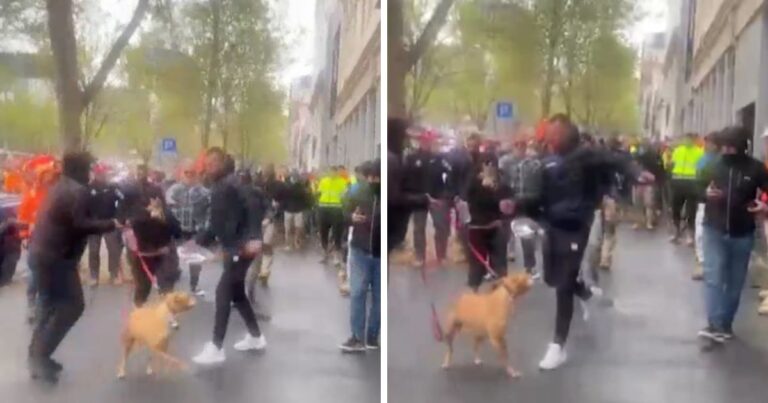A Victorian man who violently kicked a dog “in self-defence” during Melbourne’s COVID protests has avoided jail time.
Stipo Cicak appeared in the Melbourne Magistrates’ Court today where he received a 12-month good behaviour bond for the vile incident, which Magistrate Peter Reardon called a “cowardly and unprovoked act”.
“Anger is not an excuse, the dog did not provoke in any way this sort of behaviour,” Reardon said.
“I found that the dog posed no threat or sign of aggression to anyone, it was simply trying to engage and withdraw from the situation.
“The dog would’ve been surprised, shocked and felt pain. Anybody, a human being kicked, would feel the same. I’m sure the dog did too.”
The magistrate added that Cicak would forever be remembered for his callous actions.
“Dogs are human beings’ best friend. They are loyal, they’re happy to see you and they enhance our lives. They make us better people. They bring the best out of us,” he said.
“In this particular case, the accused will be captured forever on this video being cruel to an animal.”
As per the ABC, Cicak was also ordered to “donate $2,000 to the Lort Smith Animal Hospital in North Melbourne and to pay $7,000 in legal costs to the RSPCA.”
Footage of the shocking incident went viral following September 2021 protests outside CFMEU’s headquarters on Elizabeth Street, which protested against the Andrews government shutting down the state’s building industry for two weeks.
In the distressing video, Cicak can be seen approaching the dog and kicking it, before the pooch briefly leaps in the air and cowers behind his owner.
Cicak would later tell police officers that he kicked the canine because he was in “panic mode”.
“I thought the dog was going to come for me, you know. I don’t know, you do silly things yeah,” he told police.
However, prosecutor David De Witt today said Cicak showed “very little remorse”.
“It was aggressive, it was a deliberate and voluntary act and I would submit it was in the context of an accused that was lashing out in anger,” De Witt said.
“It’s relevant … to consider the victim of the offence which is an animal that was leashed, that was fearful and that the court has heard was trying to escape the situation at the time.
“It was an animal that was defenceless, and had no means to advocate for itself.”



































